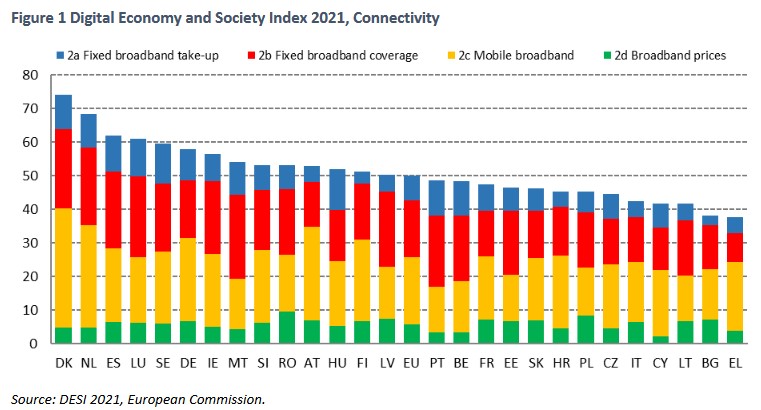Connectivity is our best ally. It is the key lever for economic recovery and for improving the welfare of society and its citizens. The pandemic has revealed the importance of connectivity infrastructures as strategic assets that, although sometimes invisible, are indispensable to today’s economy and society. It is not only bytes that flow through the networks, but also our economy, our lives, and our values. We need a strong, sustainable, and competitive telecommunications sector which can meet the challenges and opportunities of the digital society. This is our vision on how we can achieve this.
High-capacity networks for economic and social progress
European operators have been aware of this for decades and, as a result, our levels of investment have been substantial and sustained over time. Today, we are continuing our firm commitment to the deployment of state-of-the-art infrastructures, with a total investment of close to 52.5 billion euros by 2020. This is the highest figure recorded in the last six years. In the commitment to connect everyone, Spain is a paradigmatic case thanks to smart planning and investment by the sector. Spain ranks first in the EU in terms of fibre-to-the-home (FTTH) penetration with 70.6%. The European Commission recognizes that Spain “has a particularly high performance in very high-capacity networks” and it is also among the top three EU countries with the best connectivity in the region.

With high-capacity networks our businesses will be competitive, our economies will be healthier, and our job and life prospects will be much more positive.
However, much remains to be done. In an economy based on connectivity, data and the extensive and accelerated use of new technologies in both industrial processes and user services, the public and private sectors must join efforts to strengthen the technological foundations of our future. It is no coincidence that the European Commission has announced its Digital Compass, with the ambition to ensure that every household in the EU has access to an ultra-high capacity (gigabit) network by 2030 and the 5G network reaches everyone. This goal is a clear recognition of the relevance of connectivity in driving economic recovery, accompanied by the double transition, digital and green. In addition, a strong commitment is needed to increase the coverage areas of rural populations and to improve network capacity to meet the growing demand for digital services.
To do so, we need a strong and competitive telecommunications sector that can meet the challenges of digital societies. Policies and regulatory frameworks should also be adapted to achieve the objectives set out in the Digital Compass.
The vision of European leadership in digital connectivity must be complementary to and consistent with competition policy and regulatory practice in the telecoms sector. Competition policy should be geared towards enabling the internal consolidation of national markets, a necessary element for telecoms players to gain scale. With this move, users and companies will obtain better and higher quality services, leaving behind a context marked by fragmentation and an over-dimensioning of the number of players in each market, which affects their investment capacity.
Public policy frameworks must ensure a balanced digital market that foster the emergence of new business models in an investment-friendly environment.
Our stake in investment and collaboration
Improving the capacity and resilience of networks, along with expanding connectivity in rural areas, are strategic interests of the European Union, but mechanisms are needed to translate these objectives into reality.
First, the investments needed to achieve this must be facilitated. Therefore, a package of policy and regulatory measures should be developed to provide a strong incentive for the large investment required. This means changing the focus of current policies and regulation to promote lower deployment costs, spectrum policies aimed at encouraging the expansion of connectivity, and facilitating active and passive infrastructure sharing arrangements. In addition, improving access to funding and non-discriminatory subsidies through competitive processes is essential.
Secondly, technological development and innovative collaboration schemes are also essential to expand connectivity and improve its capabilities. A significant example of innovation is Open RAN, an open network architecture model that, together with Edge Computing services, will increase the capabilities and flexibility of 5G mobile networks. Regarding collaborative networks, Telefónica has extensive experience in strategic alliances aimed at bridging the digital divide, such as the agreement with Allianz in Germany or the Internet Para Todos project in Peru.
A balanced digital market
Today, telecommunication companies are not only connectivity providers, but their broad portfolio of digital services makes them a strategic partner in the digital transition processes of all sectors of the economy. Telecom operators are providers of digital services based on emerging technologies and have become a strategic ally of European industrial policy and of the digital and green transformation of companies. In the current context and taking into account the European business structure where more than 80% of companies are SMEs, companies such as Telefónica are playing a key role in their transformation processes to maintain or increase their competitive capacity both inside and outside the European Union.
On the other hand, digital platforms have become major economic players, changing market dynamics, and accelerating the digitalization of societies. Connectivity, once again, is the backbone of the services they offer and monetize. In fact, the volume of traffic they inject into networks is increasing, which requires continuous investment and ongoing technological development in infrastructure by telecommunications operators to cope with this growing demand for digital content.
However, these platforms, which profit by offering their services over the network, do not contribute fairly to the costs they generate in the infrastructures they use. This model is unsustainable. The situation must change so that the players who use the networks most to produce economic value also contribute fairly to the costs that arise from this activity. Thus, the only way to achieve a prosperous and balanced European digital environment that generates benefits for citizens and businesses is through economic contributions from all actors involved.
Moreover, the speed of technological change, the accelerating digitalization of our societies and economies, as well as the existence of obsolete regulatory frameworks are affecting profitability expectations and, therefore, the appetite for investment in infrastructure deployment. All this poses major challenges of a very diverse nature, such as bottlenecks in digital markets, gaps in user security and privacy or in the design of fiscal policies adapted to digital economies, among others.
The convergence of markets and services is also creating a situation where different economic players are not in balance as they are subject to different regulations when offering the same services. This leads to competitive imbalances that need to be urgently addressed. There is no doubt that equivalent services should be governed by the same rules to ensure a balanced competitive environment.
The European Union, aware of this reality, is already working on the Digital Markets Act, which seeks to create a level playing field for all by eliminating market distortions. To this end, it is proposing to introduce ex ante obligations for large platforms that dominate digital markets. It is also focusing its efforts on regulating content, goods and services in the digital environment with the Digital Services Act to create a safe and reliable environment for users. The approval of these instruments is becoming each day increasingly urgent.
No trust, no digitalization
Trust in the digital ecosystem today means moving towards a harmonization of regulatory frameworks at international level that promote competitive markets and the protection of people’s rights. Therefore, international agreements must embrace this two-fold dimension. The first focuses on promoting fair and balanced competition in digital markets, avoiding situations of control of the ecosystem by a very small number of players. The second, on privacy issues, to guarantee the cross-border flow of data while respecting the rights of individuals as citizens and consumers. The development of interoperable regulatory frameworks between different jurisdictions is essential to ensure the development of a globalized digital world.
To achieve this, it is necessary to encourage multilateral dialogue between governments and international organizations by creating effective channels of participation for businesses, civil society, academia, and experts of different kinds to contribute their vision and proposals. Forums such as the B20 or the current Trade and Technology Council (TTC) are examples of how to move in this direction.
Great allies of the green transformation
Digital and green transitions go hand in hand. Digitalization is not only a prerequisite for economic modernization and the transformation of productive models but can also make a positive contribution to reducing inequalities to achieve greater social equity in our countries.
The digital transition has the potential to transform our economies and societies towards a new economic model based on decarbonization, sustainability and the circular economy. In this sense, telecommunications are an enabler for other sectors to achieve progress on the path to the green transition and the fulfilment of sustainability goals. For all these reasons, the telecommunications sector is a key strategic partner for achieving the dual digital and green transition. The European Union is making decisive progress in this process. A process that we at Telefónica strongly support and in which we hope to have the opportunity to make a decisive contribution.
Our commitment to a strong and resilient telecoms industry is the foundation for driving the digital transformation and the benefits it will generate for all. It is unfeasible to erect a building without a foundation, as it is unfeasible to build the digital and just society we aspire to without robust and sustainable connectivity infrastructures, and without a strong and competitive telecoms sector.









